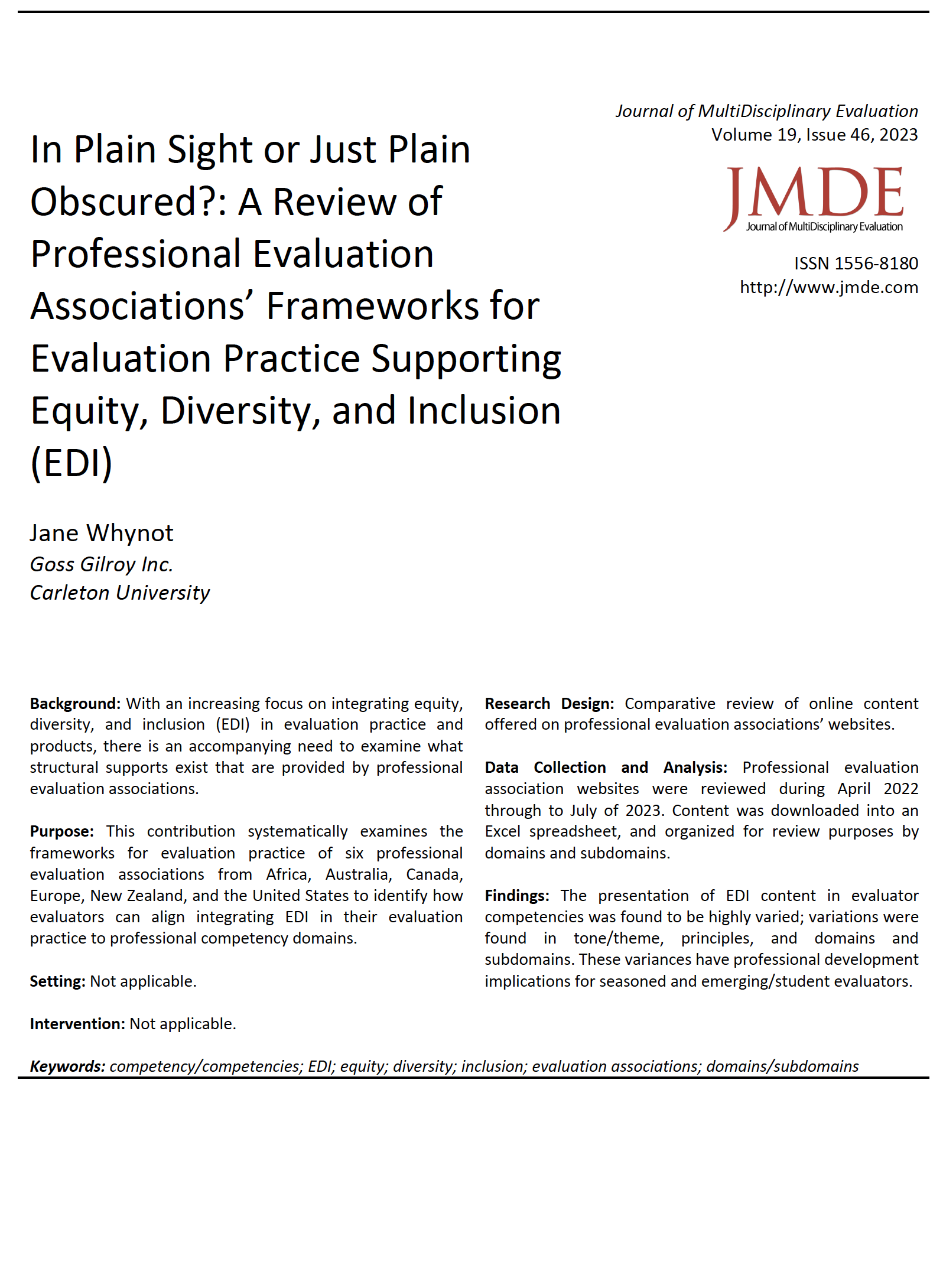In Plain Sight or Just Plain Obscured?: A Review of Professional Evaluation Associations’ Frameworks for Evaluation Practice Supporting Equity, Diversity and Inclusion (EDI)
Main Article Content
Abstract
With an increasing focus on integrating equity, diversity and inclusion (EDI) in evaluation practice and products, there is an accompanying need to examine what structural supports exist that are provided by professional evaluation associations. This contribution systematically examines the competencies of five professional evaluation associations from Africa, Australia, Europe and North America to identify how evaluators can align integrating EDI in thei evaluation practice to professional competency domains. Also offered is a summary of thoughts on training opportunities for integrating EDI given review findings. Professional evaluation association websites were reviewed during May through to July of 2022. Content was downloaded into an Excel spreadsheet, and organized for EDI review purposes by competency domains, subdomains which occurred during August and September of 2022. The presentation of EDI content in evaluator competencies was found to be highly varied; variations were found in tone/theme, principles, and domains and subdomains.
Downloads
Article Details

This work is licensed under a Creative Commons Attribution-NonCommercial 4.0 International License.
Copyright and Permissions
Authors retain full copyright for articles published in JMDE. JMDE publishes under a Creative Commons Attribution-NonCommercial 4.0 International License (CC BY - NC 4.0). Users are allowed to copy, distribute, and transmit the work in any medium or format for noncommercial purposes, provided that the original authors and source are credited accurately and appropriately. Only the original authors may distribute the article for commercial or compensatory purposes. To view a copy of this license, visit creativecommons.org
References
African Evaluation Association (AfRea). (2020). The African evaluation guidelines (English draft version) https://afrea.org/aeg/AEG_ENGLISH.pdf
American Evaluation Association (2018). The 2018 AEA evaluator competencies. https://www.eval.org/Portals/0/Docs/AEA%20Evaluator%20Competencies.pdf
Australasian Evaluation Society (2013). Evaluators professional learning competency framework. https://www.aes.asn.au/evaluator-competencies
Canadian Evaluation Society. (2018). Competencies for Canadian evaluation practice. https://evaluationcanada.ca/files/pdf/2_competencies_cdn_evaluation_practice_2018.pdf
Christie, C. A., Quiñones, P., & Fierro, L. (2014). Informing the discussion on evaluator training: A look at evaluators’ course taking and professional practice. American Journal of Evaluation, 35(2), 274–290. doi.org/10.1177/1098214013503697 DOI: https://doi.org/10.1177/1098214013503697
Clark, T., & Bradley, S. (2022, June 14-17). Comparing and contrasting the EDI language embedded in the competencies of the Canadian Evaluation Society and the American Evaluation Association (paper presentation). Canadian Evaluation Society National Conference. Winnipeg, Manitoba, Canada. https://c2022.evaluationcanada.ca/program/
European Evaluation Society (2012). The EES evaluation capabilities framework. http://www.europeanevaluation.org/sites/default/files/twgs/EESEVALUATION CAPABILITIES FRAMEWORK. pdf
King, J., Stevahn, L., Ghere, G., & Minnema, J. (2001). Toward a taxonomy of essential evaluator competencies. American Journal of Evaluation, 22(2), 229-247. doi.org/10.1016/S1098-2140(01)00129-1. DOI: https://doi.org/10.1177/109821400102200206
Rittel, H., & Webber, M. (1973). Dilemmas in a general theory of planning. Policy Sciences, 4(2), 155-169. DOI: https://doi.org/10.1007/BF01405730
Stevahn, L., King, J. A., Ghere, G., & Minnema, J. (2005). Establishing Essential Competencies for Program Evaluators. American Journal of Evaluation, 26(1), 43–59. doi.org/10.1177/1098214004273180 DOI: https://doi.org/10.1177/1098214004273180
Symonette, H., Miller, R. L., & Barela, E. (2020). Power, privilege, and competence: Using the 2018 AEA evaluator competencies to shape socially just evaluation practice. In J. A. King (Ed.), The American Evaluation Association's Program Evaluator Competencies. New Directions for Evaluation, 117– 132. DOI: https://doi.org/10.1002/ev.20433

